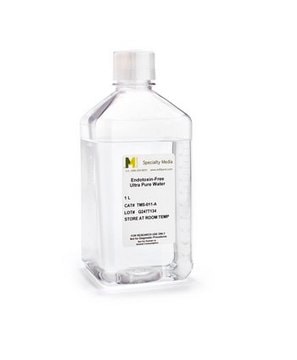MBD0025
Water
Microbial DNA-free; Suitable for PCR, sequencing and NGS
Synonym(s):
DNA-free water, Filter-sterilized water, Microbial DNA-free water, Microbiome water, UV-treated water
Sign Into View Organizational & Contract Pricing
All Photos(2)
About This Item
UNSPSC Code:
41121822
NACRES:
NA.05
Recommended Products
Quality Level
form
liquid
feature
DNA free
technique(s)
DNA extraction: suitable
DNA sequencing: suitable
PCR: suitable
shipped in
ambient
storage temp.
room temp
General description
Microbial DNA-free water is filter-sterilized and UV- treated. It undergoes stringent quality control testing to ensure that it is free of any detectable levels of DNA. The quality tests guarantee the absence of detectable levels of contaminating DNA using 35 cycles PCR amplification of 16S and 18S rDNA using universal primer sets.
Provided in 10 vials of 1.5 ml, enabling use of 1 tube per PCR setup to avoid contamination of your master stock.
Progression in Next Generation Sequencing (NGS) technology now allows identification and sequencing of microbes in relatively low quantities and in complex samples. Therefore, NGS is the method of choice for population identification in microbiome samples, as most of them include large variety of microbes and in some cases also host cells. Still, biases and errors are common in this workflow and can be introduced in different steps along this process. Reagents used must be free of any microbial contaminant to avoid introduction of exogenous error to the samples especially these with relatively low microbial counts
Provided in 10 vials of 1.5 ml, enabling use of 1 tube per PCR setup to avoid contamination of your master stock.
Progression in Next Generation Sequencing (NGS) technology now allows identification and sequencing of microbes in relatively low quantities and in complex samples. Therefore, NGS is the method of choice for population identification in microbiome samples, as most of them include large variety of microbes and in some cases also host cells. Still, biases and errors are common in this workflow and can be introduced in different steps along this process. Reagents used must be free of any microbial contaminant to avoid introduction of exogenous error to the samples especially these with relatively low microbial counts
Application
Microbial DNA-free water is suited for use in PCR assays as a negative PCR template control (1). It has been used to dilute genomic DNA template in qPCR assay to detect and quantify microbial load in water and other environmental samples and for downstream applications, such as sanger sequencing and next-generation sequencing.(2, 3) It may be used in the preparation of PCR master mixes and reagents to prevent DNA contamination problems leading to false-positive signals in real-time polymerase chain reaction detection of bacterial pathogens in biological samples. (4)
Features and Benefits
DNA-free Water: Filter-sterilized and UV-treated to ensure the water is completely free of DNA microbial contaminant to avoid introduction of exogenous error
Highest quality: Strict quality control testing for absence of detectable levels of contaminating microbial DNA
Convenient: 1 tube per PCR setup for avoiding master stock contamination
Highest quality: Strict quality control testing for absence of detectable levels of contaminating microbial DNA
Convenient: 1 tube per PCR setup for avoiding master stock contamination
Storage Class Code
12 - Non Combustible Liquids
WGK
nwg
Flash Point(F)
Not applicable
Flash Point(C)
Not applicable
Choose from one of the most recent versions:
Certificates of Analysis (COA)
Lot/Batch Number
Sorry, we don't have COAs for this product available online at this time.
If you need assistance, please contact Customer Support.
Already Own This Product?
Find documentation for the products that you have recently purchased in the Document Library.
Fishing in the water: effect of sampled water volume on environmental DNA-based detection of macroinvertebrates
Ma?chler, Elvira, et al.
Environmental Science & Technology, 50.1, 305-312 (2016)
Activity and DNA contamination of commercial polymerase chain reaction reagents for the universal 16S rDNA real-time polymerase chain reaction detection of bacterial pathogens in blood
Muhl, Helge, et al.
Diagnostic Microbiology and Infectious Disease, 66, 41-49 (2010)
Our team of scientists has experience in all areas of research including Life Science, Material Science, Chemical Synthesis, Chromatography, Analytical and many others.
Contact Technical Service
![Water, PCR Grade liquid, pkg of 25 mL (03315959001 [1 x 25 ml]), pkg of 25 mL (03315932001 [25 x 1 ml]), pkg of 100 mL (03315843001 [4 x 25 ml])](/deepweb/assets/sigmaaldrich/product/images/326/208/bac83eed-3c88-4738-b4b5-50d3b223dd1c/640/bac83eed-3c88-4738-b4b5-50d3b223dd1c.jpg)


